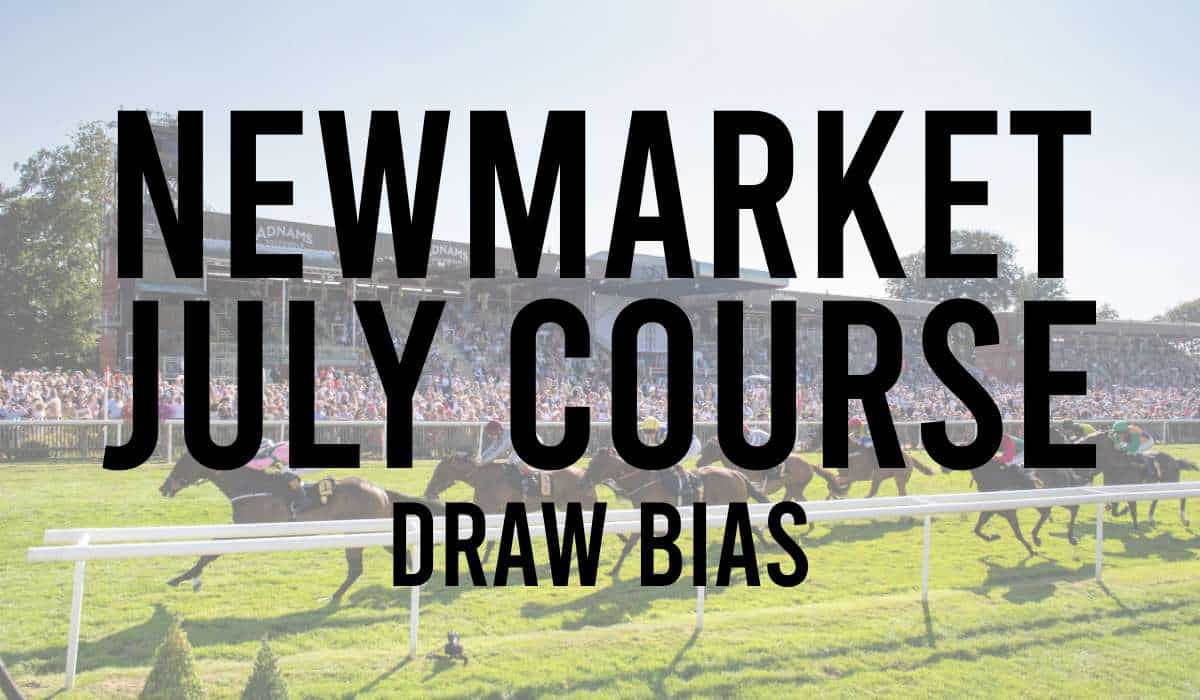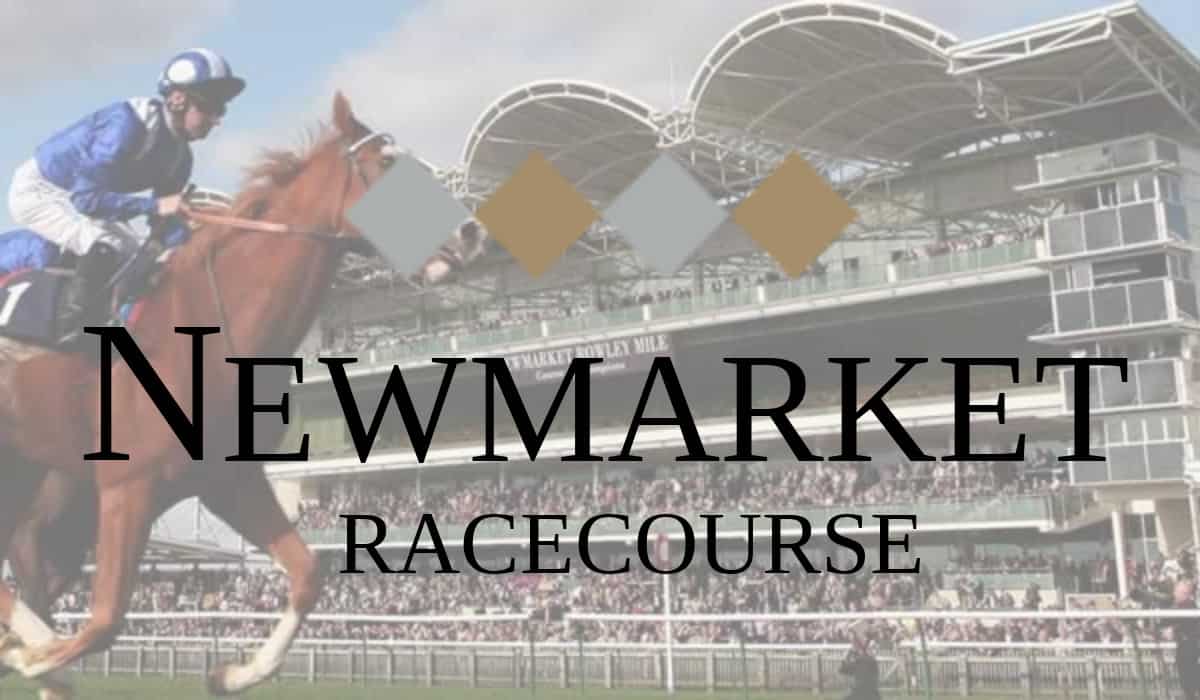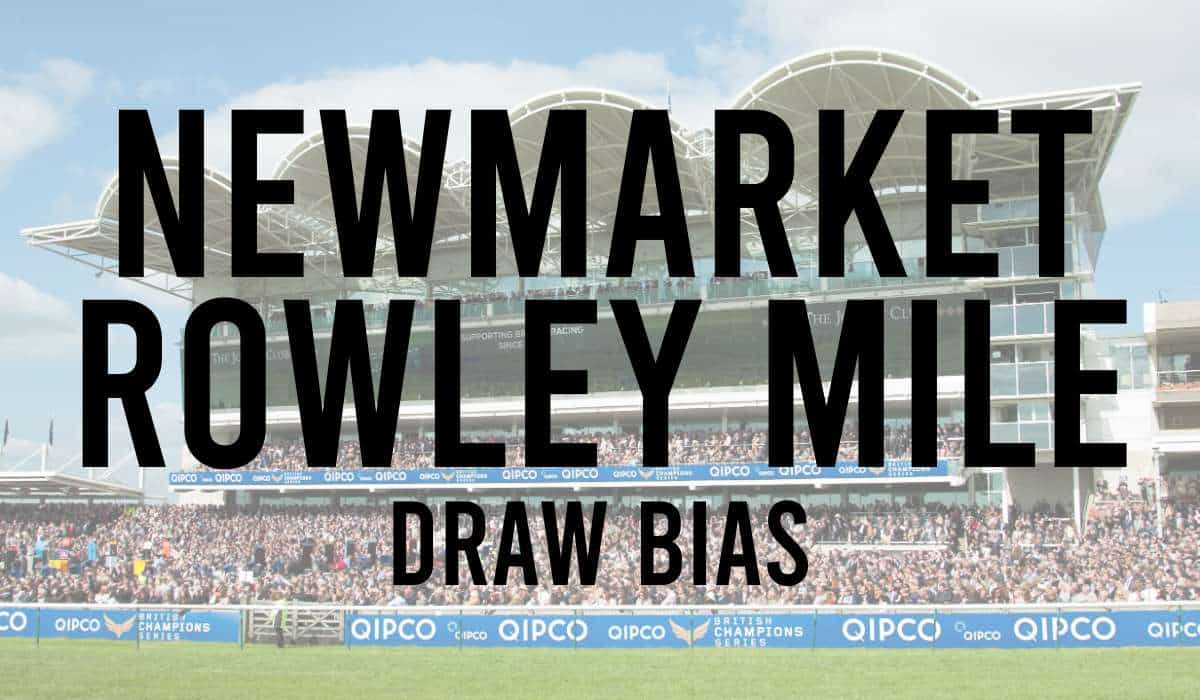Welcome to our official guide to Newmarket Racecourse, the Home of British racing.
We explore this great racecourse in detail, looking at its rich history, a guide to both of its main courses (the Rowley Mile Course and the July Course), as well as local hotel picks, fixtures, the main races, and travel information.
If you are looking for the latest betting tips for Newmarket, check out our full guide to Newmarket Racecourse tips.
Find out more about both of the Newmarket racecourses today:
Contents
- 1 Overview of Newmarket Racecourse
- 2 Newmarkets Racecourses History
- 3 Main Races and Events at Newmarket
- 4 Newmarket Racecourse Tickets
- 5 Newmarket Racecourses Map
- 6 Newmarket Racecourse Address
- 7 How To Get To Newmarket Racecourses
- 8 Hotels Near Newmarket Racecourses
- 9 Betting Shops Local to Newmarket Racecourses
- 10 Best Newmarket Online Betting Sites
- 11 Newmarket Races 2024
- 12 Newmarket Racecard
- 13 Other Events Held at Newmarket Racecourses
- 14 Popular Questions
- 15 Summary of Newmarket Racecourses
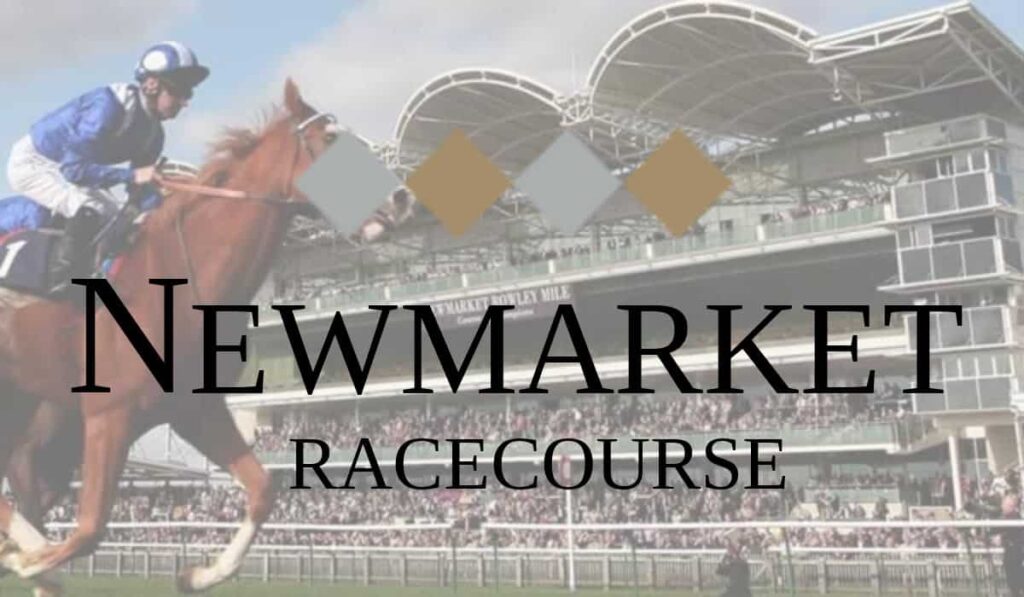
Overview of Newmarket Racecourse
Newmarket racecourse is a premier thoroughbred British horseracing venue, the current headquarters of flat racing, and boasts not one, but two, separate courses: the Rowley Mile and the July Course.
It is one of the most famous and iconic racecourses in the entire world.
With a long tradition of racing the town itself is also often described as ‘the home of British horse racing”, and when you visit, you’ll see why; Newmarket lives and breathes everything equine with a huge amount of the town’s population directly employed in the industry, almost everyone you meet is directly involved in racing or breeding and with and able to tell you a story or two, that will have you engaged and entertained.
Newmarket town itself is home to the largest number of training yards in Great Britain, along with other major racing and equestrian organisations, these including Tattersalls (the main sales ring), the National Study and the Nation Horseracing Museum; Newmarket is a must for any racing fan.
Both Newmarkets racecourses host flat racing only, and each has a capacity of just over 20,000 attendees.
The Rowley Mile is mainly a straight course of one mile and two furlongs in length. Races any longer than this are started slightly off the track and turn right-handed into the long straight.
The Newmarket July Course postcode map is a slightly shorter one-mile straight course.
Newmarket racecourses are known for this dip (downhill run) from about the 2-furlong pole before a stiff uphill finish on both the July and Rowley Mile course.
There is technically a third track at Newmarket, but it’s not entirely relevant to modern-day racing and is used just once a year for the historical Newmarket Town Plate. This is known as ‘the Round Course’.
Newmarket racecourses host a packed calendar of events year-round, and like many other British racecourses it has branched out to become a multi-purpose events venue that’s a local favourite for gigs, weddings and large parties.
It is owned and managed by the brilliant Jockey Club who look after many of the top UK racecourses.
Newmarkets Racecourses History
Racing at Newmarket can be traced back to 1622, when Lord Salisbury and the Marquess of Buckingham challenged each other to a race for the prize sum of £100; although it wasn’t for another fourteen years that any course was formally founded.
Some years later, In 1665, Charles II inaugurated the Newmarket Town Plate, a race still run at the course to this day.
FACT – When Charles II passed away, he became – and remains – the only monarch to have ever ‘raced a winner’ in a British horserace!
By 1840, there were seven annual race meetings run at Newmarket and the town around it was fast gaining a reputation as ‘the place to be’ for those who enjoyed or wanted to work in the sport. It undoubtedly is still that today.
Whilst Newmarket may not have continued its Royal patronage quite as much as other notable courses in the UK, such as Ascot Racecourse, it remains the course of favour for jockeys, trainers and experts in horseracing.
It is well attended and well regarded, with many major race meetings and events happening here every year. It is run by the Jockey Club.
Main Races and Events at Newmarket
It’s difficult to identify the biggest or most important of Newmarket’s race events – as there are so many – with the course hosting a clutch of Group 1 and other major race meetings throughout the year.
The biggest races held at the track are considered to be:
- 2000 Guineas – the 2,000 Guineas Stake is a Group 1 held on the first Saturday in May and is the start of the Guineas Festival. It is the first leg of the English Triple Crown of Thoroughbred Racing (the other races being The Derby and St Leger). The 2000 Guineas is a straight one-mile race open to 3-year-old colts.
- The 1000 Guineas – is ran the very next day to the 2000 Guineas. Again a race of Group 1 status, the 1,000 Guineas Stake is identical track and trip to the 2000 but is open to 3-year-old fillies only.
- The July Cup – is a six-furlong flat-out sprint and another Group 1 event. Many winners go on to be identified as that year’s Champion Sprinter.
- The Newmarket Town Plate – is run on the Round Course annually, over three miles and six furlongs. A historical-cultural race, prizes include a box of locally sourced sausages and is open to amateur jockeys only.
- The Fillies Mile – a one-mile, Group 1 race for 2-year-old fillies as part of the Dubai Future Champions meeting.
- Dewhurst Stakes – a 6-furlong Group 1 for 2-year-olds, often identifies the best 2-year-old colt of that generation.
- Cheveley Park – a 6-furlong Group 1 contest for 2-year-old fillies.
- The Cambridgeshire – a 1m 1furlong competitive handicap ran towards the end of the season always draws a large field and large crowd.
- The Cesarewitch – a tough long-distance handicap ran over 2miles and 2 furlongs run in late autumn and another hugely popular meeting.
- Falmouth– a Group 2 mile contest held in mid-summer is a popular and social meeting.
- Prince of Wales – a Group 2 ran over 1m 4 furlongs on the July course.
As mentioned, there are almost too many top races to mention but the above are some of the main ones.
Newmarket Racecourse Tickets
Newmarket racecourse tickets are always very popular for all of their meetings. You’ll find great offers, deals and early birds to all of their events throughout the year and we always recommend booking in advance so you get to enjoy the day out and can plan ahead.
As racing at Newmarket is so popular the events can sell out, so it is best to book early and in advance to avoid disappointment.
If you are looking for the best deals on Newmarket Racecourse Tickets follow the official link here.
Newmarket Racecourses Map
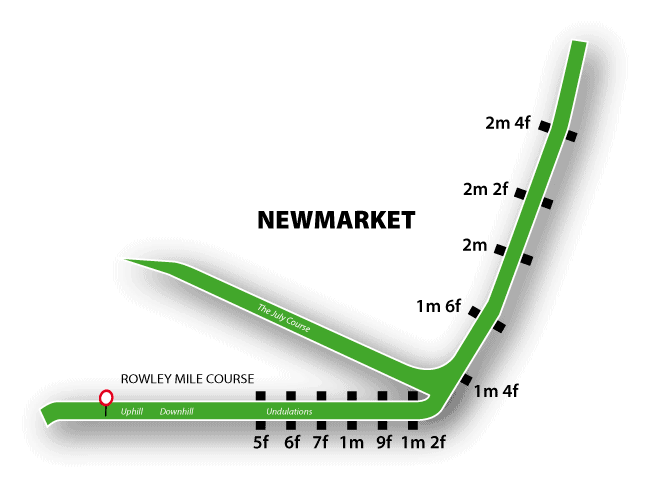
As mentioned there are two main tracks at Newmarket, The Rowley Mile is used throughout the spring and autumn seasons, and the July Course, perhaps unsurprisingly, through the summer.
With a long sweeping straight most of the races take place on a straight course but as the map above outlines long distances are accommodated with just one bend taken.
This means that draw bias is not so important and with a wide and spacious straight often the better horses come to the fore.
Newmarket Racecourse Address
The official address of Newmarket racecourse is:
Newmarket Racecourse
Foreman’s Office
The Rowley Mile
Newmarket
CB8 0TG
How To Get To Newmarket Racecourses
The ways to get to Newmarket racecourses are:
- By car – Newmarket is situated in Suffolk and is easily reached by road from London or Cambridge. There is ample free parking and four electric vehicle charging points.
- Train – a train station is in the centre of the town and a taxi can be taken to the course, or a walk will take approximately 15 minutes.
- Coaches – on race days, coaches and buses service the course directly from Newmarket town centre and areas further afield.
- Air – there are private airstrips available for patrons, but these must be booked in advance.
Hotels Near Newmarket Racecourses
Newmarket isn’t the largest of towns, but there are a few accommodation options for those choosing to extend their stay beyond just a day at the races.
The town is within walking distance from both Newmarket racecourses, and popular hotels include the Bedford Lodge and Spa (a family-run 18th-century boutique spa hotel), the Premier Inn Newmarket (a budget choice with free breakfast) and the Best Western Heath Court Hotel (an informal and relaxed hotel with restaurant and bar).
As Newmarket is frequented by so many ‘in the industry’ for work, you’ll also find a good selection of serviced apartments available for short-term hire; so if you’re looking to take a few days out and can work on a self-catering basis, these may be worth looking into.
Betting Shops Local to Newmarket Racecourses
Both Newmarket racecourses have betting shops and Tote betting facilities in all enclosures, and mobile phone signal boosters in the area give the opportunity for patrons to place bets on mobiles and online through their devices, even in the middle of the blissful countryside!
Newmarket staff are extremely used to dealing with first-time race-goers, so don’t hesitate to ask if you need any advice on having a flutter. You can find the usual independent bookies close to the track, but how many can vary by event.
In Newmarket town centre, you can find branches of Ladbrokes horse racing and Paddypower horse racing, though please note that one Ladbrokes betting shop branch is situated inside the local shopping centre (known as The Guineas) and so abides strictly by their opening and closing times.
Best Newmarket Online Betting Sites
At British Racecourses we often recommend betting online and via apps as there are many perks and benefits to betting in this way. This is because you can often get the best odds, great offers when signing up and you can place bets quickly and safely without having to queue.
If you are looking to bet online we recommend the following great deals for new customers, these are our current best betting sites.
Newmarket Races 2024
Here is the horse racing calendar for Newmarket Races in 2024:
| Date | Racecourse | Weekday |
|---|---|---|
| 16/4/2024 | Newmarket | Tuesday |
| 17/4/2024 | Newmarket | Wednesday |
| 18/4/2024 | Newmarket | Thursday |
| 3/5/2024 | Newmarket | Friday |
| 4/5/2024 | Newmarket | Saturday |
| 5/5/2024 | Newmarket | Sunday |
| 17/5/2024 | Newmarket | Friday |
| 18/5/2024 | Newmarket | Saturday |
| 19/5/2024 | Newmarket | Sunday |
| 21/6/2024 | Newmarket | Friday |
| 22/6/2024 | Newmarket | Saturday |
| 27/6/2024 | Newmarket | Thursday |
| 28/6/2024 | Newmarket | Friday |
| 29/6/2024 | Newmarket | Saturday |
| 11/7/2024 | Newmarket | Thursday |
| 12/7/2024 | Newmarket | Friday |
| 13/7/2024 | Newmarket | Saturday |
| 19/7/2024 | Newmarket | Friday |
| 20/7/2024 | Newmarket | Saturday |
| 2/8/2024 | Newmarket | Friday |
| 3/8/2024 | Newmarket | Saturday |
| 9/8/2024 | Newmarket | Friday |
| 10/8/2024 | Newmarket | Saturday |
| 16/8/2024 | Newmarket | Friday |
| 17/8/2024 | Newmarket | Saturday |
| 23/8/2024 | Newmarket | Friday |
| 24/8/2024 | Newmarket | Saturday |
| 21/9/2024 | Newmarket | Saturday |
| 26/9/2024 | Newmarket | Thursday |
| 27/9/2024 | Newmarket | Friday |
| 28/9/2024 | Newmarket | Saturday |
| 5/10/2024 | Newmarket | Saturday |
| 11/10/2024 | Newmarket | Friday |
| 12/10/2024 | Newmarket | Saturday |
| 23/10/2024 | Newmarket | Wednesday |
| 1/11/2024 | Newmarket | Friday |
| 2/11/2024 | Newmarket | Saturday |
Check out our guide for the full list of UK horse racing calendar fixtures for 2024.
Newmarket Racecard
The racecards for Newcastle races will be released the day before the races are set to happen. You can view full racecards in advance, check out – horse racing Newmarket tomorrow and horse racing today. In these, you will get an advance look at all the runners, trainers, form and riders for Newmarket races tomorrow.
You can also of course purchase a racecard from the track which carries much of the same useful information. Many like to keep these as souvenirs, especially from major UK horse races.
Other Events Held at Newmarket Racecourses
Newmarket is a stunning venue for large parties and often frequented for weddings.
A diversification into music has seen the summer evenings hosting live music concerts after a day of racing on the Rowley Mile, with the 2020 ‘Newmarket Nights’ season having booked the likes of Tom Jones, The Pussycat Dolls, Brian Ferry, Rick Astley, McFly and Alfie Boe.
Popular Questions
✅ What is the dress code for Newmarket races?
Whilst there is no strict dress code for Newmarket races in the Premier, Hospitality and Champions Lawn facilities: it is stated that no sportswear, trainers, t-shirts, fancy dress, cargo shorts, ripped or torn denim, or extreme attire can be worn.
✅ Can you wear jeans at Newmarket races?
Yes, you can wear jeans at Newmarket races.
There are no formal restrictions on jeans and denim but there are rarely seen in the Premier Enclosure. If you do want to wear jeans it is asked that it is dark denim only.
✅ How do I get to Newmarket races?
To get to New market races today there are a few options;
Newmarket is situated in Suffolk and is easily reached by road from London or Cambridge. There is ample free parking and four electric vehicle charging points.
On race days, coaches and buses service the course directly from Newmarket town centre and areas further afield.
There are private airstrips available for patrons, but these must be booked in advance.
✅ How many racecourses are there in Newmarket?
There are two racecourses in Newmarket, they are the July course and the Rowley Mile course.
Summary of Newmarket Racecourses
Newmarket is the current HQ of flat racing and is affectionately known as ‘The Home of Horse Racing’.
A trip to Newmarket is a must for any racing fan with superb facilities, knowledgable crowds and a rich history.
It is a place you will want to stay for a few days to soak up the atmosphere. There are two race tracks at Newmarket – The Rowley Mile and the July Course and the course is managed by the brilliant Jockey Club.
A British Racecourse Guide top pick and one of our Top 10 Racecourses in the country.
We adore Newmarket, it is truly the most wonderful course and town – make sure you visit!

